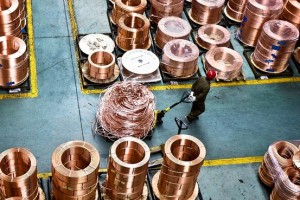The following op-ed by American Resources Principal Dan McGroarty was published in the Wall Street Journal on July 5, 2013. The original text can be found here.
A Potential Copper Bonanza Runs Afoul of the EPA
The metal is essential for wind turbines, but a proposed mine in Alaska has set off Keystone-like alarms.
By Daniel McGroarty
Activists are pushing the Environmental Protection Agency to take a drastic regulatory step that could have significant repercussions for the U.S. economy. I’m not referring to the Keystone XL pipeline or taxing carbon emissions. At issue is the Pebble Mine—a natural-resource project in Alaska that could yield more copper than has ever been found in one place anywhere in the world.
In addition to an estimated 80 billion pounds of copper, the Pebble Mine also holds strategic metals like molybdenum and rhenium, which are essential to countless American manufacturing, high-tech and national-security applications. Yet even before a plan to mine the deposit has been introduced by the Pebble Partnership, the group poised to bring the mine into production, the EPA appears all too willing to bend to the pressure of environmental activists. The EPA has conducted a hypothetical environmental assessment of the region that positions the agency to pre-emptively veto the Pebble project before the partnership even applies for a single permit.
Apparently some left-wing environmental groups, like the Natural Resources Defense Council, Earthworks and Trout Unlimited are so worried that the project might make it through the permitting process that they’re trying to stop it before it starts. As the NRDC put it in August 2012: “EPA’s study (and intervention) is critically important. If left to its own devices, the state of Alaska has never said no to a large mine.”
Thankfully, some liberals are voicing their opposition to a new EPA pre-emptive veto power. The Center for American Progress, for example, has come out in favor of letting the permitting review take place, even though the group has criticized the Pebble Mine project.
This is the first instance of a fissure in the unofficial anti-mining alliance that wants to see the EPA acquire vast new powers. With luck, more groups will emulate the Center for American Progress’s principled position.
The irony here is that renewable-energy industries that environmentalists champion, like solar and wind, rely heavily on copper. More than three tons of it are needed for a single industrial wind turbine. CIGS photovoltaic panels hold out the promise of efficiently capturing the sun’s rays, with an energy conversion rate topping 20%. The “C” in CIGS stands for copper, and the “S” for selenium, 95% of which is derived as a copper byproduct.
Electric cables, of course, carry the energy generated by these renewable sources to the national grid. The cables are usually made of copper, using the metal’s superior conductivity.
Yet to hear anti-mining activists tell it, the project at Pebble Mine offers none of these benefits. Just last week, when speaking to the trade publication Energy & Environment News on the subject, NRDC official Joel Reynolds said flatly: “We view this as one of the worst projects anywhere in the world today.”
Let’s take environmentalists’ advice and “think global” for a moment about that statement. How would a mining project at Pebble stack up against some other places where global markets currently source copper?
Will Pebble employ child-slaves as young as 8 to do the mining? Copper mines in the Democratic Republic of Congo do—and that copper is sold into the global market.
Will Pebble send its miners to work without respiratory equipment, wearing boots with holes that let acid rot miners’ feet? Chinese-run mines in Zambia do. Where are the environmentalist protests at the Zambian or Chinese embassies?
Will Pebble’s leadership be able to order local officials jailed for opposing its project? That’s what happened last month in Iran—a mining nation set on doubling its copper production by 2015—where an entire town council was jailed for opposing a marble and stone mine.
It’s easy for someone like the NRDC’s Mr. Reynolds to protest an American mine from the organization’s $5 million waterfront headquarters (the Robert Redford Building) in Santa Monica, Calif. In the U.S., protesting is a career choice, and movement leaders are feted with awards and grants. Opposing a project the size of Pebble makes a great fundraising tool. It’s far more challenging to life and limb to take on African warlords, Chinese officials or Iranian mullahs.
Environmental activists often preach that the planet is interconnected. Well, that’s certainly true of the global marketplace: Every pound of copper left in the ground in Alaska or the Lower 48 is effectively a price support for producers in the places like Zambia and Angola.
If the EPA reinterprets existing law—Section 404 of the Clean Water Act—and grants itself unilateral authority to stop the permitting process before it begins, Pebble Mine won’t be the only project in its cross hairs, and copper won’t be the only metal. A 2011 study by the Brattle Group, an economic consulting firm, shows that U.S. economic development projects worth more than $200 billion would be exposed if the EPA asserts this new power.
President Obama recently said that we must weigh the opportunity cost of not building the Keystone XL pipeline. The same logic applies to the project at Pebble Mine—and the federal permitting process is the only place to do that.
Mr. McGroarty is president of American Resources Policy Network, a public policy research group in Washington, D.C., that is supported by organizations and companies in mining and related industries.





